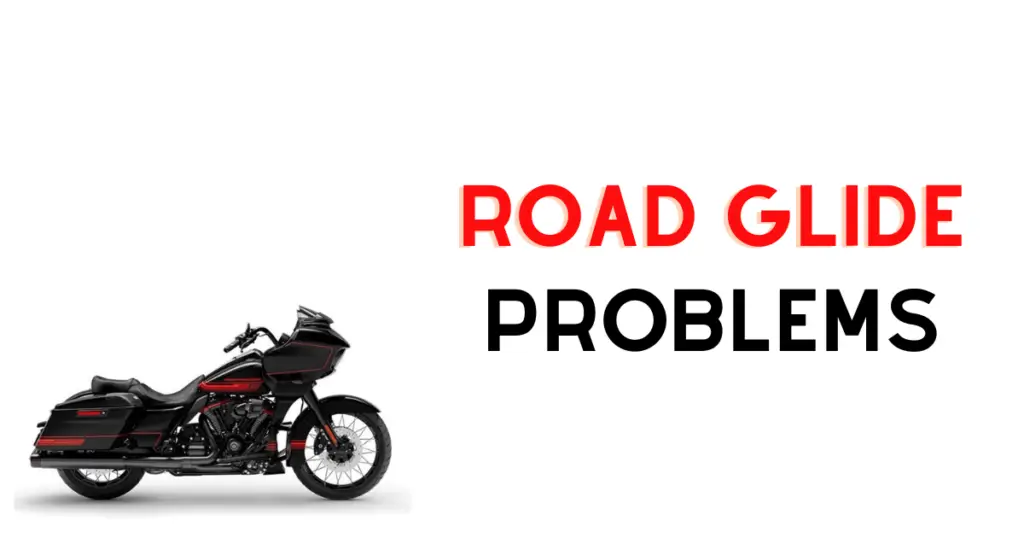If you’re a Harley-Davidson Road Glide owner, you know how thrilling it is to ride this powerful machine. However, like any other motorcycle, the Road Glide has its fair share of problems. From throttle issues to electrical system malfunctions, there are several problems that can affect your riding experience. Luckily, there are ways to prevent and fix these problems, ensuring that your Road Glide stays in top condition
Related read: 4 Harley Hydraulic Clutch Problems, Their Causes and Fixes.
One of the most common issues reported by Road Glide owners is throttle problems. After changing handlebars, some users reported issues with the throttle-by-wire (TBW) system. The bike would start and idle but would act sluggish when trying to rev up. This issue was often linked to the green TBW plug, which can be problematic, especially after changing bars. Additionally, many riders reported problems related to the bike’s electrical system. The most common complaint was about the bike’s stator failing prematurely, leading to charging issues and, in some cases, complete battery drain while on the road.
Despite these issues, the Road Glide remains a popular choice among motorcycle enthusiasts due to its sleek design, powerful engine, and comfortable ride. With proper maintenance and care, you can prevent many of these problems from occurring and keep your Road Glide in top condition for years to come. So if you’re a Road Glide owner, make sure to stay on top of maintenance and address any issues as soon as they arise to ensure a smooth and enjoyable riding experience. And if you’re a prospective Road Glide owner, keep reading cause there’s some things you need to know!
Related read: Round ‘Em Up: What Year Harleys To Avoid? (Full Overview)
General Overview of Common Road Glide Problems and Their Solutions

If you own a Road Glide, you may experience some common issues that are related to the engine and electrical components. In this section, we will discuss some of these problems and provide solutions to help you keep your bike in good condition.
Engine and Mechanical Concerns
One of the most common issues that Road Glide owners face is engine problems. Some of the common engine issues include knocking engine, loss of power, and unexpected repair costs. To prevent these problems, it is important to have your bike serviced regularly. Regular maintenance will help you catch any problems early on and prevent them from becoming bigger issues.
Another common issue is oil leaks. If you notice oil leaking from your bike, it is important to have it checked out right away. Oil leaks can lead to more serious problems, including engine failure. In addition to oil leaks, suspension problems can also occur. Worn suspension components can cause an unstable ride, which can be dangerous. To prevent this, have your suspension checked regularly and replace any worn components.
Electrical and Electronic Problems
Intermittent electrical issues can also be a problem for Road Glide owners. These issues can be difficult to diagnose and fix, but they can cause serious problems if left untreated. Common electrical problems include loss of power, faulty wiring, and electronic component failure. To prevent these problems, have your bike’s electrical system checked regularly and replace any faulty components.
Brake system issues are another common concern for Road Glide owners. If your brakes are not working properly, it can be dangerous to ride your bike. Brake problems can include worn brake pads, faulty brake lines, and brake fluid leaks. To prevent these issues, have your brakes checked regularly and replace any worn or damaged components.
Owning a Road Glide can be a great experience, but it is important to be aware of the common issues that can occur. Regular maintenance and inspections can help prevent these issues and keep your bike running smoothly. If you do experience any problems, be sure to have them addressed right away to prevent further damage.
Road Glide Custom and Special Problems Across Model Years
2012 Road Glide Custom Challenges
The 2012 Road Glide Custom faced several notable issues that impacted riders’ experiences and safety on the road.
- Oil Leaks: A prevalent issue was oil leaks, frequently due to compromised gaskets or seals, necessitating unplanned repairs and added expenses for owners.
- Ignition Switch Fragility: Riders encountered broken ignition switches, leading to starting troubles, engine stalls, flickering dashboard lights, and silent starters. The resolution typically involved replacing the ignition switch.
- Brake System Complaints: Another significant concern was brake system failures, increasing the risk and inconvenience for riders, highlighting the need for attentive maintenance.
2015 Road Glide Setbacks
The 2015 Road Glide introduced specific challenges, especially concerning the throttle and electronic fuel injection (EFI) system.
- Throttle-By-Wire (TBW) System Issues: Post-handlebar modifications, some riders faced sluggish throttle responses. This was often linked to issues with the green TBW plug, particularly after modifications.
- EFI System Error Codes: Riders reported encountering EFI-related error codes, including P1510 (EFI Limited Performance Mode), P1511 (EFI Power Management Mode), and P2176 (EFI Closed Position Not Learned), indicating the need for system diagnostics and adjustments.
2017 Road Glide Special Difficulties
The 2017 Road Glide Special model reported diverse engine, electrical, and mechanical issues.
- Engine Concerns: Notable were engine issues like premature wear, engine knock (often from faulty pistons), resulting in reduced power and performance.
- Electrical Glitches: Electrical problems varied widely from blown fuses to wiring shorts, necessitating thorough inspections.
- Excessive Vibrations and Fuel Gauge Problems: Loose bolts in the engine area caused notable vibrations, and faulty fuel sending units led to inaccurate fuel gauge readings, both impacting ride quality and safety.
21 Road Glide Special Concerns
This model experienced mid-ride power failures, suggesting a potential systemic issue affecting these model years.
22 RG ST Model Troubles
Sudden power losses during rides, with the bike stalling unexpectedly. Temporary fixes involved adjustments to the battery’s positive terminal, though the root cause remained elusive.
Read more: 6 of The Worst Road Glide Years to Avoid (For Your Sanity)
Roade Glide Safety Complaints and Associated Recalls
When it comes to owning a motorcycle, safety should always be a top priority. As a Road Glide owner, it’s important to be aware of any potential safety issues or recalls that may affect your bike.
One common issue that has been reported by some Road Glide owners is throttle problems. If you experience any issues with your bike’s throttle, it’s important to have it checked out by a qualified mechanic to ensure that it’s functioning properly. Additionally, there have been reports of electrical system malfunctions, clutch slippage, and front suspension issues in certain model years of the Street Glide.
If you’re concerned about potential safety issues or recalls affecting your Road Glide, it’s a good idea to stay up-to-date on any news or announcements from Harley-Davidson. You can also check the National Highway Traffic Safety Administration’s website for information on any recalls or safety issues affecting your bike.
Overall, by staying informed and taking the necessary precautions, you can help ensure that your Road Glide is safe and reliable for years to come.
Identifying the Most Troublesome Road Glide Years
Determining the most challenging year for the Road Glide is complex, but the 22 RG ST and 21 Road King Special models stand out due to the volume of reported issues. It’s crucial to understand that these problems might not reflect the overall quality of these newer models, as assessments are ongoing.
Notable Road Glide Models to Approach with Caution
Feedback from users highlights the 2018 Road Glide for its problematic Bluetooth feature, which has led to frustrations and workarounds, such as resorting to USB thumb drives for audio purposes.
The General Reliability of Road Glides
Despite identified issues, the Road Glide enjoys a solid reputation among its owners for its riding comfort, superior handling, and robustness for long-distance travel. Its spacious cockpit, substantial storage, and capable electrical system, alongside stock LED lights for improved night visibility, contribute to its desirability.
Personal Considerations for Owning a Road Glide
Owning a Road Glide comes down to individual preference and requirements. Many riders remain enthusiastic about their Road Glides for their undeniable comfort, effective handling, and the distinctive Harley-Davidson aesthetic. Yet, potential concerns like Bluetooth connectivity or power outage problems may lead some to explore other options.
Recap and Reflection
Though the Road Glide is largely regarded as a dependable motorcycle, specific models, notably those from 2018, 22 RG ST, and 21 Road King Special, have faced criticisms for issues such as abrupt power losses and Bluetooth connectivity challenges. However, the enduring loyalty of many riders to their Road Glides speaks to the model’s enduring appeal, balancing its shortcomings with its strengths in comfort, handling, and style. As always, buyers are encouraged to conduct thorough research and consider their unique needs in the context of reported issues.
Maintenance and Upkeep Recommendations to Avoid These Issues
Routine Maintenance Tips
To keep your Road Glide running smoothly and avoid potential issues, it’s important to perform regular maintenance. Here are some routine maintenance tips you should keep in mind:
- Change the engine oil and filter every 5,000 miles or as recommended by the manufacturer.
- Check the brake fluid level and brake pads regularly to ensure they are in good condition.
- Inspect the tires for wear and damage and maintain the recommended tire pressure.
- Clean and lubricate the drive chain or belt as recommended by the manufacturer.
- Check the battery and electrical system regularly to ensure they are functioning properly.
By following these routine maintenance tips, you can avoid premature wear and repairs and keep your Road Glide in top condition.
Avoiding Premature Wear and Repairs
While regular maintenance can help prevent premature wear and repairs, there are also some additional steps you can take to avoid potential issues. Here are some tips to keep in mind:
- Avoid riding your Road Glide aggressively or pushing it beyond its limits.
- Don’t ignore any warning signs or unusual sounds from your bike. If you notice anything out of the ordinary, have it checked by a professional mechanic.
- Use only high-quality parts and fluids that are recommended by the manufacturer.
- Avoid riding in harsh weather conditions or on rough terrain that could cause damage to your bike.
By following these tips, you can help prolong the life of your Road Glide and avoid costly repairs down the road.
Frequently Asked Questions
What are common issues faced by Road Glide owners?
Road Glide owners have reported several common issues with their motorcycles. Some of the most frequent problems include engine knock, loss of power, and premature engine wear. Other issues include transmission glitches, fuel tank problems, and cam chain tensioner issues.
What does the diagnostic code on my Road Glide indicate?
If your Road Glide is displaying a diagnostic code, it is an indication that there is a problem with the motorcycle’s engine or other systems. You can use a diagnostic tool to read the code and determine the issue. It is recommended to take your motorcycle to a mechanic for repairs if you are not familiar with diagnostic codes.
What maintenance tips can help prevent Road Glide mechanical problems?
Regular maintenance is essential to prevent mechanical problems with your Road Glide. Some tips to keep your motorcycle running smoothly include checking the oil level regularly, inspecting the air filter, and changing the oil and filter at recommended intervals. It is also important to keep the tires properly inflated and to check the brakes regularly. If you are not familiar with maintenance procedures, it is best to take your motorcycle to a qualified mechanic.




Leave a Reply
You must be logged in to post a comment.